DLM Conference 2011, Brussels
Attended the triennial DLM conference last week. The theme was 'Interoperability and MoReq2010 - Making intelligent information control a reality'. There were some excellent presentations/sessions and there was a lot of discussion and networking during the breaks.
Some interesting points:
- the work of DIGIT (the European Commission’s Informatics Directorate) and FEDICT (the Federal Agency for ICT, Belgium)
- the scope of interoperability. I wasn't the only speaker to highlight that it is more than the technical & semantic dimensions and that the organisational and legal dimensions, including political issues or set in the political context, are equally important and probably more difficult to resolve
- the promise and potential of MoReq2010 and ideas for further modules
- review of the EU data protection legislation - likely to be 'on the books' in 2015. Peter Hustinx, EU DP Supervisor made so many sensible and pragmatic points in his closing keynote. Amongst them were the new legislation would aim to empower data subjects (users) adding to existing rights the 'right to be forgotten' (interesting in the light of publications such as Mayer-Schonberger's book 'Delete' http://press.princeton.edu/titles/8981.html) and the 'right to data portability' - both important in the digital and social networking contexts. Clarification of the need for 'consent' was an issue those drafting the legislation needed to 'think about'.
- the discussions about the importance (or not) of tweets and their 'status' - are they records? Are they information assets?
- Eric Ketelaar's re-presentation of record keeping (or records formation as he prefers) and archiving - not two overlapping circles in the typical Venn diagram but a circle (archiving) within a larger circle (record keeping). Something for us to think about!
- very little on cloud issues (at least in the sessions I attended).
The conference ended with a call for more people/organisations to join the DLM Forum to exchange ideas, undertake work and a proposal to make the conference a biennial rather than triennial event. Very sensible in the dynamic, fast moving digital domain.
Presentations are to be uploaded to the conference website www.dlmconference.com










